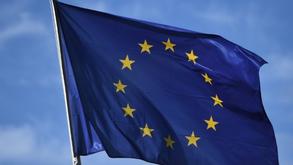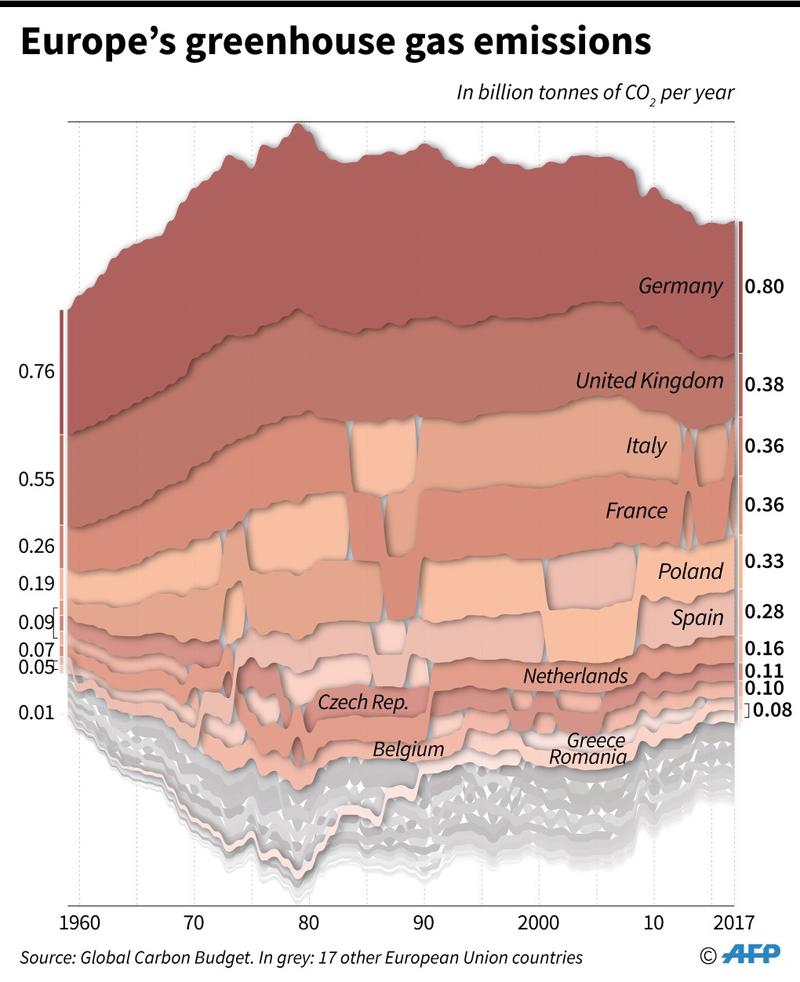 A European flag flutters in the wind in front of the European Commission headquarters in Brussels, March 14, 2018. (EMMANUEL DUNAND / AFP)
A European flag flutters in the wind in front of the European Commission headquarters in Brussels, March 14, 2018. (EMMANUEL DUNAND / AFP)
STRASBOURG — The EU budget chief said the bloc needs to invest dedicated funds to avert a “climate crash” as Brussels detailed how it planned to pay for a trillion euro push to cut net C02 emissions to zero by 2050 and protect member countries dependent on coal.
The financial challenge for Europe is huge: the European Commission executive arm estimates that halving emissions by 2030 would require 260 billion euros of investment a year in the energy, transport and construction sectors.
“We need climate cash in order to avoid a climate crash,” European Budget Commissioner Johannes Hahn told Reuters on Tuesday.
We need climate cash in order to avoid a climate crash
Johannes Hahn, European Budget Commissioner
ALSO READ: Amnesty: Climate change tops list of global issues for young people
Of the 1 trillion euros of the EU’s 10-year investment plan, roughly half is to come from the EU long-term budget, the Commission said. This will trigger more than 100 billion in co-financing from governments.
It was unveiling details of its Sustainable Europe Investment Plan using public and private money for its flagship project: the European Green Deal.
Some 300 billion would come from private sources and another 100 from the EU’s Just Transition Fund that is to help the EU’s coal-dependent regions, such as Poland’s Silesia mining region, make the transition to “green”.
The EU is in the last stretch of talks on the size and spending goals of its next long-term budget from 2021 to 2027.
All EU countries except Poland agreed last month they should transform their economies over the next 30 years to not emit more carbon dioxide than they absorb, so as to limit global warming and resulting climate changes.
The deal came amid overwhelming support from Europeans who see irreversible climate change as the biggest challenge they are facing, more so than terrorism, access to healthcare or unemployment.
“I’m doing this in my grandson’s future interest,” Hahn, 62, said about his work on financing the EU’s shift to a green economy.

STATE AID RULES
Poland did not subscribe to the 2050 emissions-neutrality goal, arguing its energy systems and economy were too dependent on coal and lignite to make the transition over that time. The Just Transition Fund is to address this problem.
“Yes, I think it will be enough (to convince Poland to join the 2050 climate neutrality goal),” Hahn said.
“It is very attractive because it gives them the opportunity of additional money, access to interesting financing,” he said.
The Fund is to “benefit territories with high employment in coal, lignite, oil shale and peat production, as well as territories with carbon-intensive industries which will be either discontinued or severely impacted by the transition”, the Commission proposal said.
The money will go to areas producing the most CO2 industrial emissions, where job losses and the need for teaching new skills and will take into account the overall wealth of the country so that a region in need of transition in the EU’s poorest Romania would get more money than a comparable region in Germany.
The total of 100 billion euros will come from a mix of sources and will mostly be a result of leveraging of 7.5 billion euros of input from the EU budget, EU guarantees and European Investment Bank loans, to attract private cash by covering the riskiest parts of an investment.
READ MORE: Consensus sought on climate change mitigation measures
To increase financing options, the EU will also review its state aid rules by the end of this year, which normally prohibit governments from helping companies in trouble so as not to distort competition.
Governments will be allowed to spend on renewable energy, public charging infrastructure or waste recycling, support workers sacked from closed mines, invest in energy efficiency of buildings, help district heating or climate neutral production processes or the closure of coal-fired power plants.
As well as being a huge challenge, the commission sees a switch to an economic model not based on burning fossil fuels for energy as a great opportunity for European industry to shift to making environmentally clean, re-usable and repairable products based on renewable energy sources.


